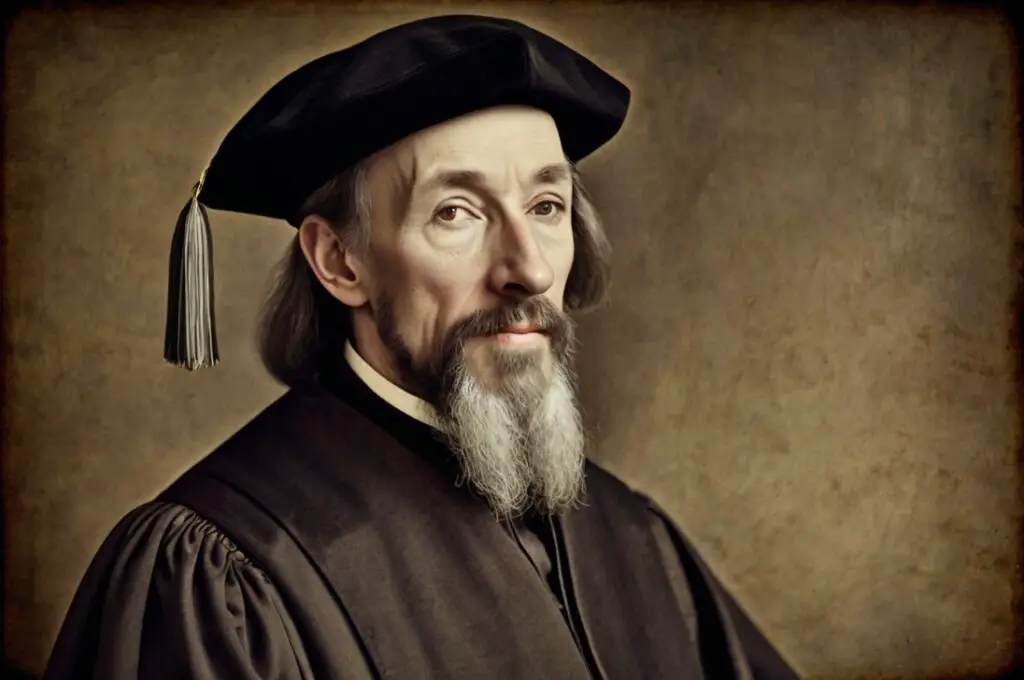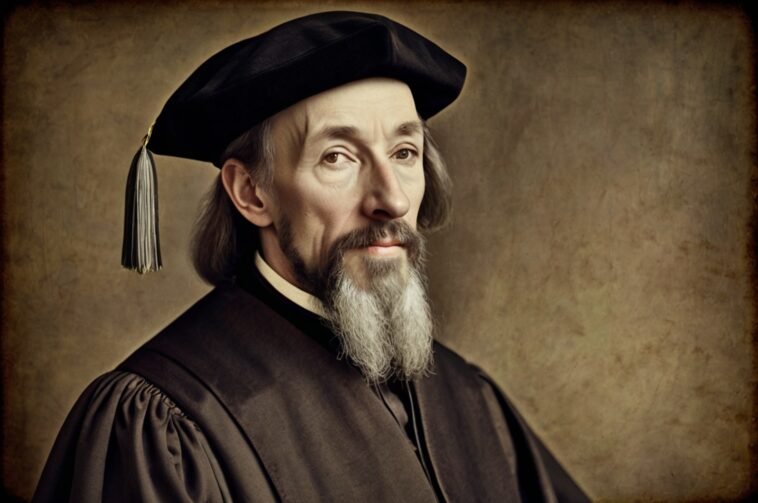
The 16th century was a time of great change and discovery.
It was an era marked by religious revolutions, shifting political powers, scientific breakthroughs, and global exploration that forever changed the world.
The people who lived during this time made a lasting impact on history.
From religious leaders to powerful monarchs and bold explorers, these figures helped shape the world we know today.
In this blog post, we’ll take a closer look at some of the most influential people of the 16th century and how they contributed to the development of modern society.
Religious Leaders
Martin Luther
One of the most important figures of the 16th century is Martin Luther, a German monk who ignited the Protestant Reformation.
In 1517, Luther famously nailed his 95 Theses to the door of a church in Wittenberg, where he criticized the practices of the Catholic Church, particularly the sale of indulgences.
His courageous actions led to a split in Christianity and the birth of Protestantism.
Luther emphasized that faith alone could lead to salvation and translated the Bible into German, making religious texts accessible to ordinary people.
This shift significantly changed the Christian landscape.
Luther’s ideas spread quickly, aided by the recent invention of the printing press, with hundreds of thousands of his pamphlets circulated within just a decade.
His work laid the foundation for religious freedom and the variety of Christian denominations we see today.
John Calvin
While Luther started the Reformation, John Calvin expanded on it.
A French theologian, Calvin’s writings, especially his influential book Institutes of the Christian Religion (1536), established Calvinism, a branch of Protestantism that emphasizes predestination and the sovereignty of God.
His ideas spread throughout Europe, notably impacting societies in Switzerland, Scotland, and the Netherlands.
Calvin’s approach to church governance, which relied on a system of elders, became a model for Presbyterianism.
This framework also greatly influenced the development of democratic governance, particularly in Europe and North America.
Ignatius of Loyola
In response to the Protestant Reformation, Ignatius of Loyola founded the Society of Jesus, commonly known as the Jesuits, in 1540.
This Catholic order played a key role in the Counter-Reformation by focusing on education, missionary work, and defending the Catholic faith.
The Jesuits established schools and universities across Europe and beyond, helping to spread Catholicism to the Americas, Africa, and Asia.
Ignatius’ commitment to education and discipline left a lasting impact on Catholicism and contributed to the Church’s global expansion.
Today, the Jesuits remain one of the most influential Catholic orders in the world.

Political Leaders
Queen Elizabeth I
Queen Elizabeth I ruled England from 1558 to 1603, a time often called England’s Golden Age.
During her reign, she oversaw the defeat of the Spanish Armada in 1588, the flourishing of English culture, and the rise of England as a global power.
Elizabeth skillfully balanced various political factions, managed religious tensions, and created an environment where the arts, especially the works of William Shakespeare, could thrive.
Her leadership was crucial in shaping England’s future, particularly its emergence as a colonial power.
Elizabeth is also remembered for promoting religious tolerance between Catholics and Protestants, which helped prevent the sectarian violence that affected many other European nations.
Philip II of Spain
In contrast to Elizabeth’s relatively tolerant approach, Philip II of Spain (1527-1598) is often linked to the Spanish Inquisition, which aimed to maintain Catholic orthodoxy through severe measures against heretics and non-Christians.
Under Philip’s reign, Spain became the world’s most powerful empire, controlling vast territories in Europe, the Americas, and Asia.
However, his aggressive policies, including the unsuccessful invasion of England and conflicts with the Netherlands, drained Spain’s resources and marked the beginning of its decline as a superpower.
Despite these challenges, Philip’s reign significantly impacted the expansion of the Spanish Empire and the spread of Catholicism around the globe.
Suleiman the Magnificent
The 16th century was also a time of great achievement for the Ottoman Empire under Suleiman the Magnificent (1494-1566).
Ruling from 1520 to 1566, Suleiman expanded the empire’s territories across Europe, the Middle East, and North Africa, making it one of the most powerful empires of the era.
His reign was characterized by legal reforms, cultural support, and military conquests, earning him the nickname “The Lawgiver.”
Suleiman’s military and administrative skills bolstered the Ottoman Empire’s dominance in both Europe and the Islamic world.
His legal reforms have even influenced modern legal systems in the region..

Scientific and Intellectual Figures
Nicolaus Copernicus
Nicolaus Copernicus (1473-1543) changed the way we understand the universe with his heliocentric model.
In his groundbreaking work De revolutionibus orbium coelestium (1543), Copernicus argued that the Earth revolves around the Sun, challenging the long-standing geocentric view that placed the Earth at the center of everything.
Although his ideas were controversial at the time, they laid the groundwork for the Scientific Revolution and transformed humanity’s perspective on its place in the cosmos.
Copernicus’ model greatly influenced later scientists, including Galileo Galilei and Johannes Kepler, marking a pivotal moment in the history of astronomy.
Galileo Galilei
Galileo Galilei (1564-1642) expanded on Copernicus’ heliocentric model with his own astronomical observations, made possible by the advanced telescope he developed.
He discovered the moons orbiting Jupiter, observed the phases of Venus, and provided key evidence supporting the heliocentric theory.
His findings challenged the Catholic Church’s geocentric beliefs, which ultimately led to his trial by the Inquisition in 1633.
Although Galileo was forced to retract his statements, his work laid the foundation for modern science and is often viewed as a significant moment in the ongoing conflict between science and religious beliefs.
William Shakespeare
The 16th century also saw the rise of William Shakespeare (1564-1616), who is widely regarded as the greatest playwright in the English language.
His works, including Romeo and Juliet, Hamlet, and Macbeth, continue to have a lasting impact on literature and theater.
Shakespeare’s plays delve into timeless themes like love, power, betrayal, and the human experience, ensuring their relevance even today.
Shakespeare’s influence goes beyond literature; his plays have shaped the English language, culture, and even politics, solidifying his status as one of the most important cultural figures of the 16th century.

Explorers and Colonizers
Christopher Columbus
Christopher Columbus (1451-1506) is often credited with opening the Americas to European exploration and colonization.
In 1492, he set sail under the Spanish crown and landed in the Bahamas, mistakenly thinking he had discovered a new route to Asia.
His voyages marked the start of European colonization in the New World, which transformed global history through the exchange of goods, culture, and people.
However, this also resulted in the exploitation and devastation of Indigenous populations.
Columbus’ legacy is complex; while he played a crucial role in shaping the modern world, his voyages also initiated significant challenges for Native peoples, particularly through the Columbian Exchange that connected the Eastern and Western Hemispheres.
Ferdinand Magellan
Ferdinand Magellan (1480-1521) is best known for leading the first successful circumnavigation of the globe.
Although Magellan himself was killed in the Philippines before the journey was completed, his expedition demonstrated that the Earth is round and that sailing around the world is possible.
Magellan’s voyage opened up new maritime routes, enhancing trade and cultural exchanges between Europe and Asia.
Hernán Cortés
Hernán Cortés (1485-1547) was a Spanish conquistador who led the conquest of the Aztec Empire in 1519.
With a relatively small force, Cortés managed to capture the Aztec capital, Tenochtitlán, and overthrow the powerful ruler Montezuma II.
His conquest resulted in the collapse of the Aztec Empire and established Spanish rule in Mexico, paving the way for further European colonization of the Americas.
Francisco Pizarro
Following in Cortés’ footsteps, Francisco Pizarro (1478-1541) led the Spanish conquest of the Inca Empire in Peru.
In 1532, he captured the Inca emperor Atahualpa, effectively bringing the empire to an end and establishing Spanish control over vast territories in South America.
Pizarro’s actions had significant consequences for the Indigenous people of South America and helped solidify Spain’s position as a dominant colonial power in the New World.

Final Thoughts
The 16th century was a period of incredible change, shaped by the actions of religious reformers, political leaders, scientists, and explorers.
The people we’ve talked about in this article had a huge impact on shaping the modern world.
Whether through religious movements, scientific breakthroughs, or global exploration, their legacies are still felt in our societies, cultures, and beliefs today.



